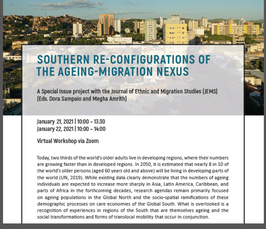"Southern Re-Configurations of the Ageing-Migration Nexus"
Workshops, conferences 2021
- Start: Jan 21, 2021
- End: Jan 22, 2021
- Location: Zoom Meeting

For more details please contact menster@mmg.mpg.de.
Today, two thirds of the world’s older adults live in developing regions, where their numbers are growing faster than in developed regions. In 2050, it is estimated that nearly 8 in 10 of the world’s older persons (aged 60 years old and above) will be living in developing parts of the world (UN, 2019). While existing data clearly demonstrate that the numbers of ageing individuals are expected to increase more sharply in Asia, Latin America, Caribbean, and parts of Africa in the forthcoming decades, research agendas remain primarily focused on ageing populations in the Global North and the socio-spatial ramifications of these demographic processes on care economies of the Global South. What is overlooked is a recognition of experiences in regions of the South that are themselves ageing and the social transformations and forms of translocal mobility that occur in conjunction.
With this special issue, we focus on southern experiences of ageing and migration in and across multiple regions. We make an intervention in the fields of migration and ageing studies by showing how Eurocentric models of ageing are too often taken for granted as ‘natural’ or universal, while dominant approaches to migration have yet to fully acknowledge the diversity and magnitude of mobilities outside the Global North. This special issue attends specifically to groups that remain at the margins of existent scholarly and policy work: namely, ageing adults from low- and middle-income regions of the world whose experiences are shaped by migrations within national borders, across regions of the South (i.e. South-South mobilities), and to places in the North. Their experiences are bound up with contemporary expressions of global capitalism, postcolonial relationships, and border regimes in ways that also generate new inequalities within and across regions.